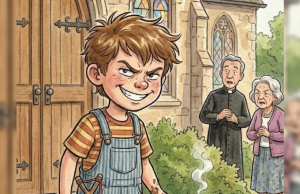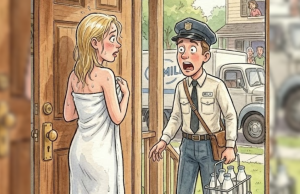
My name is Talia, and for a long time, I believed love meant doing everything so others wouldn’t have to.
I kept our home tidy, the pantry stocked, the baby fed, the teen barely on time, and made sure my husband didn’t collapse under the weight of his construction boots.
I thought that was what love looked like. I thought it was enough.
Then one day, my son laughed at me with his friends, and it hit me: I’d built a life where being indispensable had slowly morphed into being invisible.
I have two sons.
Eli is fifteen and carries that sharp, restless teenage energy. These days, he barely lifts his head when I speak. His words come in grunts, sarcasm, or the occasional muttered “Thanks.”
Noah is six months old and pure chaos wrapped in tiny limbs.

My husband, Rick, works long days in construction. He’s exhausted when he gets home, physically and mentally. But instead of rest, he demands dinner and a foot rub.
He has a saying—repeated almost daily like a slogan: “I bring home the bacon. You just keep it warm, Talia.”
He always says it with a grin, like it’s some inside joke. But every time I hear it, something inside me knots tighter.
Eli hears it too. And lately, he’s started repeating it, armed with the smugness only a teenage boy can muster.
“You don’t work, Mom. You just clean. Maybe cook.”
“Why are you tired? Isn’t that just what moms do?”
At some point, my life had turned into a joke, and I hadn’t even noticed.
Last Thursday, Eli had two friends over. I could hear them raiding the kitchen, tearing through snacks I’d laid out earlier. Then came the laughter—careless, thoughtless.
“Your mom’s always cleaning or doing baby stuff.”
“Good thing your dad works. Otherwise, how would you afford those games?”

The sound was sharp. Cruel. Like glass breaking.
I wanted to shout. To hurl the laundry basket across the room and let the mismatched socks and burp cloths rain down in protest. I wanted to call out every boy in that kitchen.
But I didn’t.
Yelling wouldn’t teach Eli what he needed to learn.
So I walked in, smiled so wide it hurt, and handed them another jar of cookies.
“Don’t worry, boys,” I said sweetly, “someday you’ll understand what real work looks like.”
That was the moment everything changed.
What none of them knew was that for eight months, I’d been quietly building something of my own. I’d been picking up small freelance jobs—translating short stories, blog posts, whatever I could find. The hours were brutal. My back ached. My eyes burned. But I kept going.
And I saved every cent.
Not for luxury. But for liberation.
Two days after that kitchen moment, I packed a diaper bag, grabbed Noah’s sling, and booked a secluded cabin in the mountains. I didn’t ask for permission. I didn’t wait for anyone’s approval. I simply left a note on the counter:

“Gone to the mountains with Noah for a week.
You two figure out who’s cooking and cleaning.
Love,
Your Maid.”
When I returned, the house looked like a war zone.
Eli opened the door. He had dark circles under his eyes and a stained hoodie. Rick stood behind him, stiff and tired.
I didn’t say anything right away. I just kissed Eli on the head and walked in.
The silence that followed said more than any apology ever could.
Since then, things have shifted.
Eli does his own laundry now. He loads and empties the dishwasher without being asked.
Rick cooks twice a week. No declarations. No drama. He just rolls up his sleeves and starts chopping.
They both say thank you now. Not the performative kind. Real gratitude—quiet, consistent, meaningful.

As for me?
I still clean. I still cook. But not out of duty. Not to earn my place. I do it because this is my home, too—and now I’m not the only one keeping it afloat.
When I’m folding laundry, Eli doesn’t just breeze past anymore. He pauses.
“Need help, Mom?” he asks.
Sometimes I say yes. Sometimes no. But the offer is there.
Rick doesn’t crack “maid” jokes anymore. He uses my name again.
Because now they see me. Not as a background character in their lives. But as the woman who held everything together, and who was strong enough to walk away when no one noticed she was carrying it all.


















